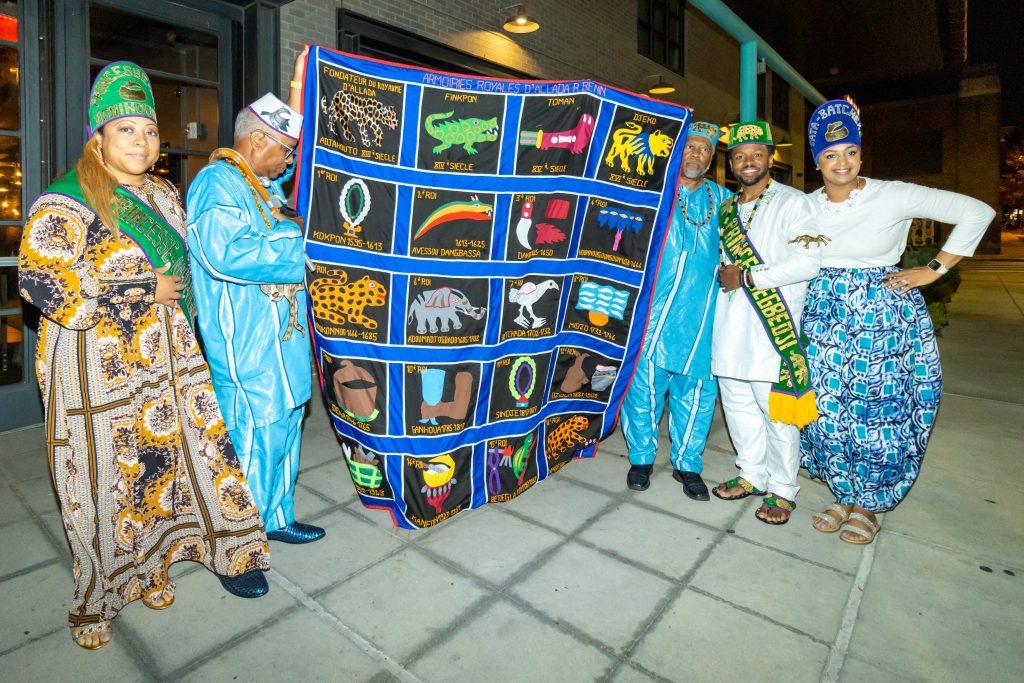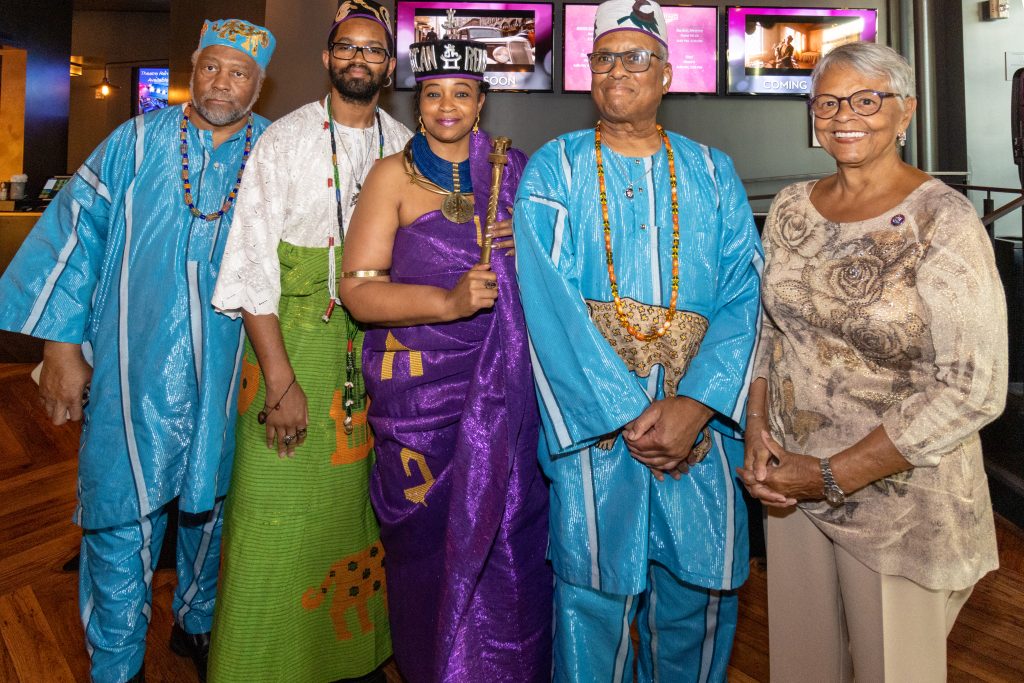By HRM Queen Mother Sêmévo Dr. Dòwòti Désir
I am a Kpodjito – a Woman King. A member of the Haut Conseil des Rois du Bénin (the High Council of Kings of Bénin) and a descendant of the Kingdom of Danxome (Dahomey/the Republic of Bénin). The historical drama, “The Woman King,” recently opened. From the moment I saw Viola Davis’s character Nanisca emerge from a canopy of wild grass in the dark of night with her Agoodjé, I watched the film with breath held, and tears brimming my eyes. I love seeing powerful women of African descent in action. I love being one. The Agoodjié were warriors, and the finely tuned instruments of power in Africa prior to the 20th century. As an elite corps these female soldiers and commanders, were founded in the 1700’s by a Kpodjito whose short reign was written out of Africa’s monarchy, Her Royal Majesty Tassie Hangbe.
The acquisition of power, and sustaining it is often vicious. It seems more so (the operative word being “seems”) because it is women battling within their/our hearts for self-understanding; among each other because we are human beings seeking recognition; against patriarchy because we demand equality and fairness. Within the historical context of this film, we encounter women embattled in a system that would later come to be recognized as a crime against humanity: the enslavement of Africans. So we have women fighting for justice, both personal and collective. At the core of the battles depicted in, “The Woman King” is General Nanisca – a Kpodjito – who fought for her vision of a new Danxome, and a renewed Africa. She waged war on behalf of her sister warrior Agoodjié, her King but ultimately our lives, our sanity, and our future generations of women. While we’ve received glances of the Agoodjié in the Marvel franchise “Black Panther” as well as, in an episode of HBO’s, “Lovecraft Country,” this is a story we have never before seen in American cinema. For that it should be applauded.
You are called to join the king’s guard. No kingdom in all of Africa shares this privilege. Train hard. Fight harder. We fear no one. And we fear no pain. I offer you a choice. Fight, or we die.
— General Nanisca, The Woman King
Like it or not, this exceptional army – the Agoodjié of Danxome, living under exceptional circumstances had limited choices about the morality of their actions. I will not apologize for their actions but I will try to understand their situation. I place myself within the space they occupy, and ask myself what would have been my response given the responsibilities at hand, and the cards dealt by fate. As a Haitian American whose forefathers actually fought in the Haitian Revolution, and whose Great Grandmother Eluminad hailed from the Kingdom of Danxome, I know when you are a part of something, you’re either in it, or out. Those who have the courage to stand against whatever “it” is, shall confront like the Agoodjié depicted in the film, the decision to either fight or die. Ultimately those of us truly determined to bring about social change must make the same commitment, “Fight, or we die”.
The Woman King, is a film is filled with pathos. It presents extraordinary actors whose characters have precise stories to share which teach us some facet of this experience. This film will have its many critics especially those so called “influencers” who never heard of the Kingdom of Danxome, and until yesterday did not know the difference between Bénin Republic, and the Kingdom of Benin. Our metanarrative as African descendants is complexed and nuanced. As a human and children rights activist, I argue it’s time the curricula of our schools start teaching African and African Diaspora history in elementary schools as readily as they do American and European-centered history. We have a right to memory. We can’t afford to have our young people of African descent wait until they get to college to learn Ourstories, and that is, if they are able to make it through the educational system that far. Understanding one’s contributions to world history must occur long before our 16th year on planet Earth. That lone paragraph in 4th grade American history textbooks about “slavery” and emancipation isn’t enough.
“The Woman King” confronts the issue of enslavement and the arguments for and against its justification as well as, a Hollywood movie can be expected to do. The rest is up to the audiences to do their homework. Enslavement is more than the capture of physical bodies but also the contraction of social space. Make some noise by un-silencing our stories. Use y/our voice, y/our dance, y/our ability to make film, music, y/our poetry, spoken words, and write codes to liberate and decolonize space. Use y/our African based sacred sciences, y/our collective epistemologies and intelligences to share what we know and more importantly what we don’t know. Work hard so that we find the best answers together. Each us has a charge to do y/our research; speak to y/our elders; analyze the information acquired and then debate. Three clear messages are delivered by, “The Woman King” and it’s Kpodjito: one, know who or what you’re fighting against. Two, master the totality of the principles you are defending and know why defend them. Three: fight or die for what you believe in.
Understand the art of war. As Africans and African descendant peoples that harsh truth has been our reality for over 500 years. As a Kpodjito my mandate includes sharing that very knowledge, and doing all that I must to protect our communities, and our allies.
******************
+ Kpodjito means “She Who Birthed the Leopard”. It is the tradition Fongbe word for the title known in French as, la Reine Mère or English, Queen Mother.
The author of this article is Her Royal Majesty Queen Mother Dr. Dòwòti Désir, Queen Mother of the African Diaspora, Bénin Republic. To learn more about her mission, sign up for the Imperial Corps Agoodjié of the African Diaspora at: www.imperialcorpsagoodjie.org enter the case sensitive password: ICA*ADET.



